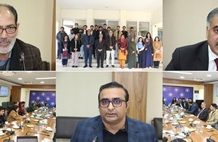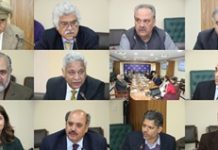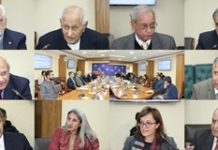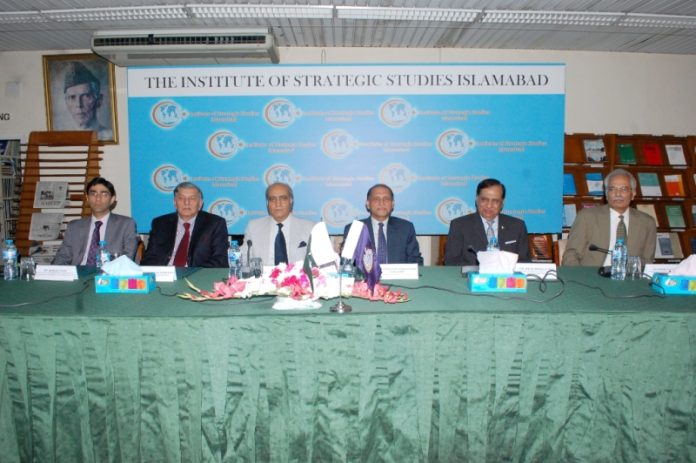PRESS RELEASE
Book Launch
on
“Brokering Peace in Nuclear Environments: US Crises Managements in South Asia”
Institute of Strategic Studies Islamabad
September 5, 2018
“The risk of India-Pakistan crises remains high and the US and other actors – China, Russia and Britain – will continue to show up to influence the trajectory of crises. It is, therefore, in the interest of the US and Pakistan to maintain a healthy relationship with each other,” said Dr. Moeed Yusuf at the launching ceremony of his latest book, Brokering Peace in Nuclear Environment: US Crisis Management in South Asia. The book launch was organized today by the Institute of Strategic Studies, Islamabad (ISSI). The esteemed commentators, at the book launching ceremony included: Former Chairman Joint Chiefs of Staff Committee, Gen. (Retd) Ehsan ul Haq; Former Foreign Secretary, Mr. Riaz Khokhar; and Professor Development Studies, S3H, National University of Science and Technology (NUST), Dr. Rifaat Hussian.
Moeed Yusuf introduced his new book which has been published by the prestigious Stanford University Press. The book examines India-Pakistan crises since the nuclear tests of 1998 and specifically focused on the US role during the Kargil war, the ten-month long 2001-02 military standoff, and the Mumbai crisis following the 2008 terrorist attacks in the city. It is the first book by a Pakistani scholar that produces original scholarship on the issue of nuclear deterrence and crises between two nuclear states. Yusuf explained that one of the reasons India and Pakistan said they acquired nuclear weapons was to gain greater strategic independence from powerful external actors like the US. His research however finds that since the 1998 nuclear tests both sides have become more, not less, dependent on the US and other outside actors to diffuse crisis situations. The US has been extremely active as a mediator and India and Pakistan have both tried to use the US to gain concessions from each other. While he explained that the US worry about nuclear war trumps its concerns about its foreign policy leanings during the crisis, a breakdown of the US-Pakistan relationship in the future could make it very difficult for the US to influence Pakistani behavior and to resist the temptation of siding with India. Pakistan may seek to bank more on China in future crises. Yusuf predicted that the risk of India-Pakistan crises remains high and the US and other actors will continue to show up to influence the trajectory of crises. It is therefore in the interest of the US and Pakistan to maintain a healthy relationship with the each other. Yusuf hoped that this book will encourage young Pakistani scholars to contribute original scholarship to western literature so that we could have a more informed debate about Pakistan and the South Asian region.
Earlier, while welcoming the author, esteemed commentators and the audience, Director General ISSI, Ambassador (Retd) Aizaz Ahmed Chaudhry praised Dr. Yusuf’s valuable contribution to the nuclear dynamics of South Asia. He, however, raised three questions: Why peace eluded South Asia? Why has brokering not work? And, how does the future look like? In the larger global context, he explained how South Asia has always been caught up in the big powers’ fight, in which India and Pakistan were always on opposite sides and the big powers could do little to mitigate their crises. Any attempts, on the US side, were either half-hearted or impeded by the Indian claims that this is entirely a bilateral matter. Now when the Indo-US strategic partnership has deepened, India is emboldened to play hard ball with Pakistan, which has made the prospects of peace elusive.
Gen. (Retd) Ehsan ul Haq complimented the book as a symbol of evolving strategic thought on the matters of nuclear deterrence and crises. He questioned, however, whether the growing Indo-US strategic partnership can redefine the mediating role of Washington between India and Pakistan. He stated that US enjoys, and would continue to enjoy the supremacy in the field of surveillance and monitoring, which enables it, even in the foreseeable future, to continue its role as a peace broker.
Mr. Riaz Khokhar appreciated the author’s intellectual input which comes with a refreshing element of objectivity and neutrality. He also pointed out the “strategic bias” of the US which is expected to gain more prominence in the context of Indo-US convergence of interests. He stated that unfortunately, as of present, the element of trust between Pakistan and India is lacking to an unimaginable level. India and Pakistan should work towards building such an environment where candid talks could be held.
Dr. Rifaat Hussian remarked that the concept of ‘Brokered Bargaining’ as put forth by Moeed is as much a theory of process as it is that of outcome and makes his work an outstanding original contribution towards enhancing our understanding of South Asian nuclear crises management. He also highlighted the centrality of Afghan factor in the trilateral model, which is missing in Moeed’s work.
In the concluding remarks, Chairman Board of Governors ISSI, Ambassador (Retd) Khalid Mahmood stated that it is evident that while the US has met the pre-requisites of diffusing crises, recent events have showcased that the US cannot broker honestly and objectively. Instead, its present role is conversely de-stabilizing. However, that does not take away the importance of foreign brokering in times of crisis.












